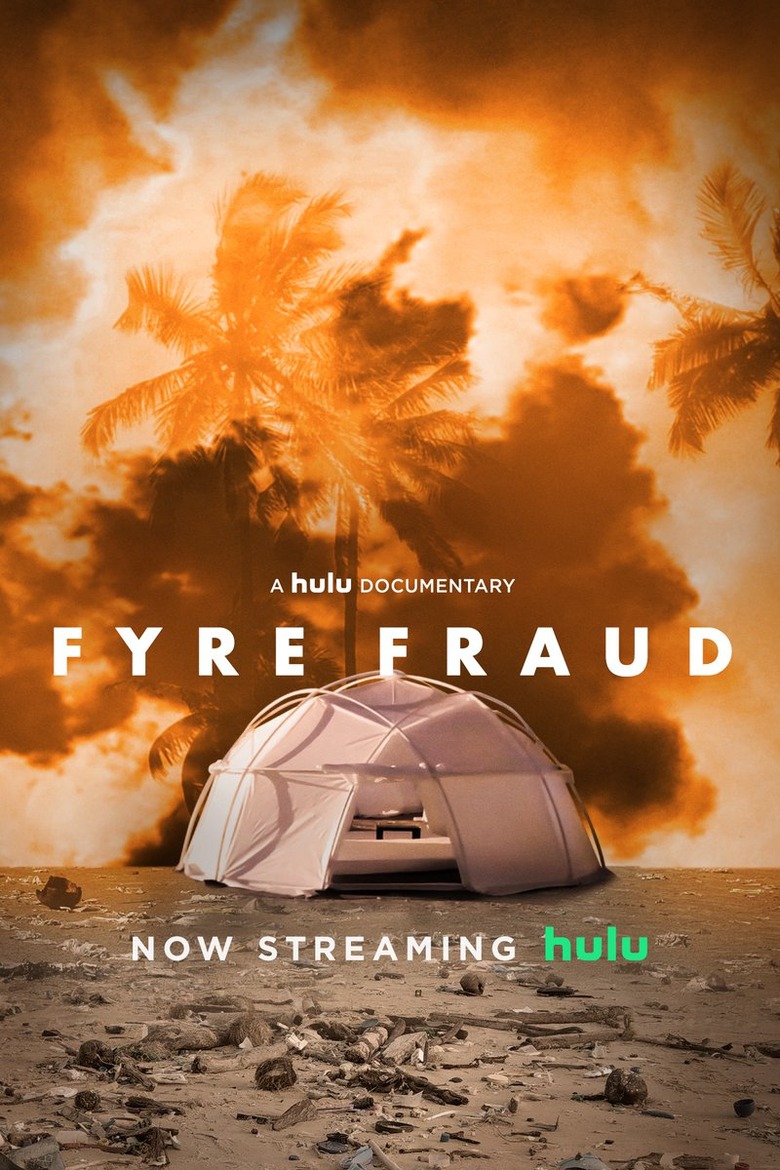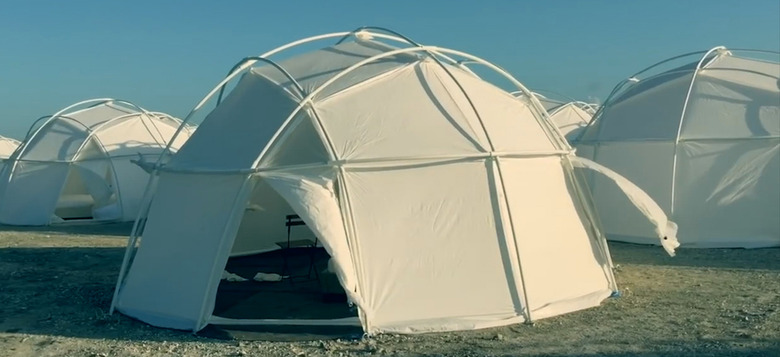'Fyre' And 'Fyre Fraud': Which One Is Better? (And Which One Is Less Ethically Compromised?)
It's been less than two years since the debacle of the Fyre Festival. The proposed event on a Bahamian island was going to showcase major musical acts such as Blink-182 and Major Lazer; it was overseen by, among others, rapper Ja Rule; and it would create a new Coachella or Burning Man for the social-media elite.Of course, the dreams of the festival organizers were revealed to be impossible at best and criminal at worst; when attendees (who had paid an insane amount of money) arrived, they found something closer to a disaster zone than a luxury party atmosphere. The ensuing insanity provides fodder for not one, but two documentaries that dropped online last week. Ironically enough, just as Hulu's Fyre Fraud and Netflix's Fyre: The Greatest Party That Never Happened document the ethical and moral breakdown of the failed event, they also shine a light on the ethics and morals, or lack thereof, of modern documentary filmmaking.
On Shaky Ethical Ground
Last week began with Hulu pulling a Beyonce on everyone, by revealing that its own documentary on the Fyre Festival, directed by Julia Willoughby Nason and Jenner Furst, was available for subscribers. Hulu had announced that they were making a Fyre docuseries back in April of last year, but it was a genuine shock to see that they had stolen Netflix's thunder. Moreover, the Hulu documentary offered an added bonus (depending on how you look at things): Billy McFarland, the man behind Fyre who is now spending time in jail for his crimes, gave an exclusive interview for this documentary. Plus, Hulu got a few extra days on Netflix, which released Fyre on Friday.The last week has thus spurred on an intense debate online (primarily on Twitter) over both the quality of the two films — despite the Hulu documentary being available for a few extra days — and over their very existence. Because, yes, it's about ethics in documentary journalism. As Fyre Fraud points out near the end with a smug sense of glee, the media company Jerry Media, which was heavily involved in marketing the Fyre Festival, was one of the credited producers of Netflix's documentary, directed by Chris Smith. You might have raised an eyebrow at that revelation — how can a documentary do what audiences expect from a good, successful documentary (a documentation of the truth) if it's being bankrolled by the people who helped market what was essentially a very large con targeted at influencer culture? How could Fyre not be heavily biased?The larger wrinkle came through a further revelation in an essay at The Ringer by Scott Tobias. In discussing the two films with Tobias, Chris Smith stated that Billy McFarland had been willing to talk for the Netflix doc, but the rival doc had offered him $250,000 to talk. As Smith explained to Tobias, "...after spending time with so many people who had such a negative impact on their lives from their experience on Fyre, it felt particularly wrong to us for him to be benefiting." This, in spite of the fact that McFarland was willing to negotiate down to $100,000. It should be noted that Furst, in the same Ringer essay, denies the quarter-million figure while also acknowledging that the Hulu documentary did pay McFarland, who he (with good reason) dubs "a compulsive liar", for his interview.After watching Fyre Fraud, it's doubly mystifying that anyone paid McFarland to talk, both for the very clear ethical issues (if I'm supposed to doubt one documentary produced by people involved in the Fyre Festival, I'm definitely going to be skeptical of another documentary paying the criminal ringleader to talk), and because McFarland shares very little information of insight in his exclusive interview that can't be found anywhere else. Outside of cutting a figure that suggests both sociopathy and terror akin to that of a kid who's been caught doing something he knows is wrong, McFarland has even less insight than that of the talking heads who pipe in with their own thoughts on the event, on Millennial culture, and more.
The Mockable Millennial Culture
Once you move past the ethical fragmentation of Fyre Fraud—my searing #hottake is that if you pay a convicted criminal who doesn't seem to grasp what he did to bilk hundreds of people out of hundreds of thousands of dollars is wrong, you are not being very ethical—you're left with a documentary that manages to both rush through its story and not provide much insight. The film's level of insight is established in an early talking-head interview: a young journalist describes how, even before the Fyre Festival, Billy ran up against the U.S. Attorney for the Southern District of New York, an entity, he says, "you might know from the show 'Billions'."In case you didn't already get the connection, Fyre Fraud then helpfully includes a clip of said Showtime drama to hammer home the point. The clip itself offers no insight; it's just there to make sure you're on the ball. The use of pop culture to presumably emphasize the arguments being made by the film's participants happens a lot, frustratingly so. Everything from Parks and Recreation to a Dave Chappelle stand-up bit makes a cameo in Fyre Fraud, a tactic that serves to diminish the jaw-dropping story of how the Fyre Festival came to be and quickly unraveled.McFarland himself is a glassy-eyed figure in his interviews. He's a presumed shell of whatever truly charming individual he must have been to convince so many people to invest in his outrageous schemes, from Fyre to a credit-card scam to even a post-Fyre con that got him in trouble, selling tickets for parties like the Met Gala and the Victoria's Secret Fashion Show, both of which are events that don't...sell tickets. The hollow tone he strikes is all the more vexing, because it suggests the filmmakers didn't get their money's worth for his involvement. (Though it fits his previous con-artist decisions.)It's to Fyre Fraud's credit that, in spite of paying McFarland for his participation, he doesn't get off easy. (Post-viewing, though, I'd love to know how many of the other people in the documentary — mostly journalists, lawyers, and a few attendees — were aware that he'd been paid to participate.) There's no way to make McFarland a figure of fun or charm, and the movie doesn't try to make him a smooth talker. But Fyre Fraud, in how it presents the empty interviews with McFarland and in how it paid him a lot of money to talk about the crimes he committed by swindling people, is on ethically shaky ground.
Telling the Same Story Soberly
And yet others would raise a more skeptical eyebrow at the documentary that arrived later last week, Netflix's Fyre: The Greatest Party That Never Happened, from director Chris Smith. (You might know Smith best from his early-2000s documentary American Movie, about a very strange guy and his desire to make a movie no matter what the cost.) There are some to-be-expected crossovers between Fyre and Fyre Fraud. Not only are they using the same misbegotten event as the subject of their films, but both movies are roughly the same length (95 minutes) and even speak to some of the same people.That said, the way each documentary tackles the Fyre Festival is vastly different. People defending the Hulu documentary will immediately remind you that Fyre was partially produced by Jerry Media, the media company that worked on marketing the Fyre Festival before it became a worldwide laughingstock. Though that's true, Jerry Media and its Millennial marketers don't come off looking like the hidden heroes of the Fyre Festival debacle, but that's because there really aren't any heroes in this piece.Leave aside the ethics of these documentaries, and that the quest for truth in documentary filmmaking will arguably always be elusive. These filmmakers made calculated decisions in who they talked to, what comments from the talking heads they left in, when to cut away, etc. Even the best documentaries will always have dubious ethics. Importantly, where these documentaries diverge is in their tones.The directors of the Hulu documentary, themselves in the same broad age range that qualifies them as Millennials, almost instantly strike a smug tone. Fyre Fraud uses an excess of pop-culture references (and clips from a lot of TV shows that you can find streaming...on Hulu), and it replicates meme-style fonts to echo what its participants are saying at a given moment. By the end of Fyre Fraud, one of the ex-employees of Jerry Media says that "everyone" was to blame, a culmination of a documentary that wants to present a surface-level exploration of why people had such glee in mocking the attendees of Fyre Festival as much as the festival itself.Fyre, on the other hand, is a far more sober documentary. Smith doesn't use a lot of flashy techniques to gussy up the already insanely shocking revelations throughout the build-up to and disastrous day of the festival itself. Perhaps the most jaw-dropping story comes from event producer Andy King, who was apparently called upon by McFarland to convince Customs to release four eighteen-wheelers full of water to the festival grounds. King, a gay man, was exhorted to give the head of Customs a blow job, and as King describes, he was perfectly willing to do so. This shocking anecdote is the apex of the jaw-dropping stories you'll hear in either documentary, but it showcases a fatal flaw neither documentary is able to tackle: explaining why people were so seduced by Billy McFarland.
An Enigma of a Villain
McFarland, as mentioned above, only gave the Hulu documentary an exclusive interview, which might seem like a leg up, except he offers little to no insight to the filmmakers. Fyre isn't lacking for McFarland's presence; if there's any advantage to working with Jerry Media, it must be the treasure trove of footage that Smith's able to use for the final product. (That may be the primary reason why Jerry Media is even listed as a producer.) As such, you see more than enough of McFarland, from his partying on the beaches of the Bahamas during the now-infamous commercial shoot with ten of the top supermodels around the world, to falling asleep at the side of the ocean during the middle of the day. The real kicker comes at the very end, as you see footage of McFarland, after his first court appearance post-Fyre, directing people to commit a vast ticketing scam.But none of the footage you see in either Fyre or Fyre Fraud reconciles the number of people in both documentaries who talk about how much they believed in Billy, or in Fyre Festival, or in the Fyre app. (Meant to enable the user to book major talent for events, the Fyre app was supposed to be the whole point of the Fyre Festival.) There's never a moment in either documentary, either in watching McFarland's new interview or in the countless shots of him partying or, again, committing crimes on camera, where the cult of personality surrounding him makes a lot of sense. Where Fyre succeeds that Fyre Fraud doesn't is in visually communicating how screwed over so many of these people were by buying into the notion of the Fyre Festival, from software designers to Bahamian restaurateurs and contractors. Where Fyre is sober, Fyre Fraud is snide, a Millennial-made documentary attacking Millennials with Millennial-era tropes.After watching both Fyre and Fyre Fraud, it's easy enough to be reminded of how much artifice goes into any documentary, as much as we may expect them to be entirely about capturing and presenting the truth. Fyre Fraud quickly divorces itself from reality with its reliance on gags and clips, as if they exist to keep the audience paying attention lest we get too bored with the events on camera. (And again, when you're paying a convicted criminal to talk to you, even though you acknowledge he's a compulsive liar, you're not being terribly ethical.) Fyre tries to take another tack, while itself being a not-entirely-convincing version of the truth due to only exploring certain avenues in part. Each of these documentaries took ethical shortcuts to arrive at the same conclusion; only one did so by mocking its participants.



